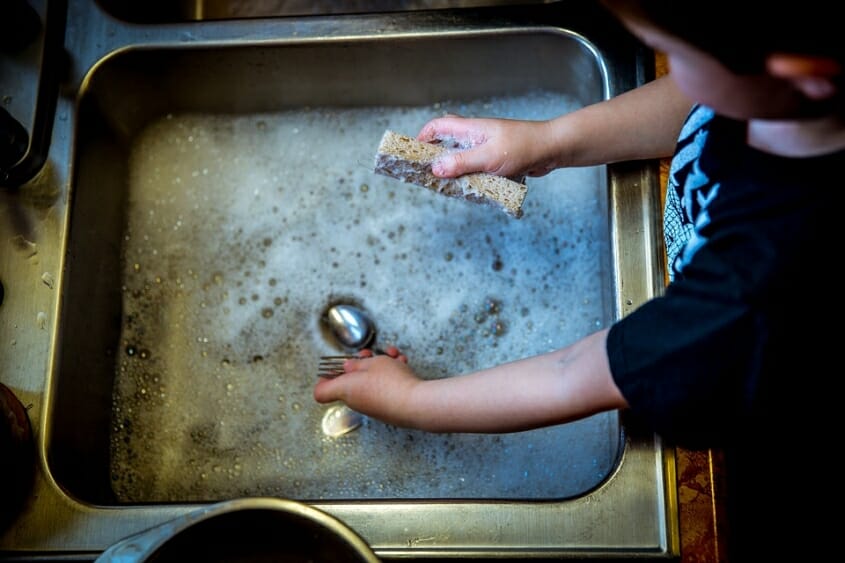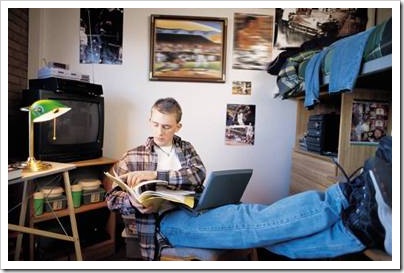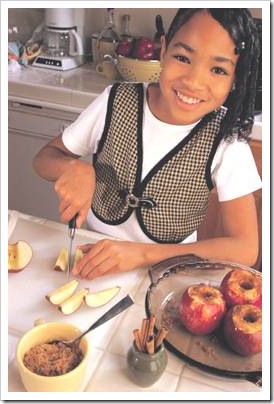
Many of the conflicts between parents and kids are related to household chores. What usually happens is that parents are (of course) responsible for the household chores and find it very difficult to handle everything by themselves, so they ask the kids to share the load of cleaning and taking care of the house.
In the stereotypical house, Mom is in charge of what happens inside the house: cleaning, washing dishes, washing the kids and feeding, while Dad is mostly in charge of what happens outside: swimming pool, fixing and mowing.
I believe that this separation of responsibilities is the source of the conflict between parents and kids. If one parent needs to do one thing and the other is the other, where is the sense of togetherness and where is the sharing?
I remember my childhood years, when cleaning the house was no fun at all. My mom left for work very early, my dad worked two jobs and we had to clean the house, over which we had many, many fights.
Fighting over who was going to wash the dishes was the “story” of my family. We would hate each other, tell on each other, fight and cry just to avoid washing or cleaning. There were five of us and even now, 30 years later, we all remember the nasty fights over house chores.

Like most families, arguing and fighting over chores is part of life. Research has found that conflicts regarding house cleaning are the #3 reason for divorce, after infidelity and sex. Are you getting this? Number three! So, if you change your kids’ perception about cleaning the house, you may help them stay in their relationships longer.
When I was 16 and realized that the life I am in was no fun and I did not like it at all, many things changed. I still lived at home with my two younger sisters and we were still angry at each other and still fought a lot. “It’s your turn”, “No, it’s your turn” was the common communication between us.
Does it matter who will wash the dishes?
Then, I realised that the whole cleaning business was just a perception problem. You see, I was born into the arguments about cleaning and washing the dishes. Until I was 16 and 2 of my older siblings had left home, this way of life was the only way I knew and I never thought I could change it, until I did.
Washing the dishes took 10 minutes and every second of it was painful. For 10 minutes, I was feeling sad, miserable and humiliated and I wondered if I would feel differently if I did it together with someone else and it took us 5 minutes.
By the way, each of us had about 2 hours of chores a week, so I felt like that every second of my two hours chores.
So, I went to my younger sisters, who were 13 and 7 years old at the time, and suggested this. “Let’s take all the household chores and do them together. Worst case, it will take us the same time, but at least we will be together and we won’t feel so bad”, and they agreed to try it for a week.
For one week, we did everything together – cleaning, washing and making dinner – and it was faster than usual. The arguments changed to fun and even cleaning the toilet (the most humiliating chore in our family) was not so horrible anymore.
From being enemies living in the same house, we became best friends. For the first time ever, the house was spotless and we would come up with chores that our parents did not even ask us to do, because we had such a good time together.
Because chores now took us less time, we had lots of time to do what we wanted and, since we became good friends, we started doing many other things together. We did our homework together, we helped each other with school tasks, we started playing together, dancing, listening to music and even reading books together. Our life changed completely.
If everyone is moving forward together, then success takes care of itself
Henry Ford
You see, a hard task that is shared is much easier to handle, not to mention the side effects of good relationships. My mom and dad worked so hard they could not do things together and we, as kids, were so busy fighting and arguing that sharing the load was not an option.
The successful experience with my two younger sisters that changed our perception helped me a lot with my own kids. At every age, they helped and shared and we never had the “It’s your turn” debates, although we do take turns doing some of the chores.
In our modern life, with dishwashers, I still see many families fighting over cleaning. Now, instead of “It’s your turn to wash the dishes”, they say “It’s your turn to put the dishes in the dishwasher”, so technology, although it helps a lot, is not the answer to the stressful perception regarding cleaning. Good habits are.
Habits for sharing
Habits of sharing are very good for kids. It will save them painful memories of conflicts and might help them establish good relationship with their siblings. Remember, One day they will leave home and will share their house with someone else. You want them to have a good attitude towards cleaning the house and sharing.
Now that many families do their spring-cleaning, here is a list of things you can do with your kids to change from “No, it’s your turn to hang the laundry” to “Let’s do this together”.
- When setting the table, set the table together. As long as everyone is around to help set the table, it is a family activity. Even the youngest kids can bring plates or forks to the table.
- Same with clearing the table. We have a rule in our house that clearing the table is done all the way to the kitchen. The rule is simple: as long as there is someone standing in the kitchen and doing something, everyone stays and finds something useful to do.
 You can still take turns washing the dishes, but if everyone else around is doing something to help (clearing the dishes, cleaning the table, cleaning the bench, throwing the rubbish out) everyone is happy. Instead of hard work, it is easier, faster and much more fun, because you do it together.
You can still take turns washing the dishes, but if everyone else around is doing something to help (clearing the dishes, cleaning the table, cleaning the bench, throwing the rubbish out) everyone is happy. Instead of hard work, it is easier, faster and much more fun, because you do it together.- Fold the laundry together. If it takes one person an hour to fold, iron and hang the laundry in the cupboards, it takes four people 15 minutes and during that time, they can sing and tell jokes. Little ones can fold underwear and find matching socks.
- Clear the garage together one weekend. At the beginning of the work, make sure you tell everyone what you expect them to do, what they can and cannot do and how long you are going to dedicate to it and make it fun.
- When we come home from a picnic or a trip, we have a competition with ourselves. In the car, just before we get home, we talk about breaking our own record of putting everything back in its place. If one person does it, it takes forever, but if all five of us do it, we can clear a week’s camping trip in 20 minutes (most of the stuff goes in the laundry basket anyway, right?).
- Avoid asking one kids to wash the car by themselves. At first, do it with them and make it fun. After a while, you can let them do it but make sure they do it together. The car belongs to everybody, so everybody can take care of it.
- Have a cleaning hour together. With younger kids, you will have to be in the same room with them while cleaning together. Gradually, you can do something in another room while they clean theirs. Always start with doing things with them and avoid the “my room – your room” situation. If you say to a kid, “This is your room, clean it”, you are giving them the permission to say, “This is my room, and I can do whatever I want with it”. The house belongs to everyone!
- Gardening is a good way to teach sharing. Have “working bees” in your back yard. Kids of every age can participate.
Sharing is caring
Household chores are part of life, whether we like it or not. If you teach your kids that certain chores are Dad’s responsibility or Mom’s responsibility, you miss the part that makes you a family, the togetherness. Remember,
Many hands make light work
John Heywood
Be happy in life,
Ronit
 You can still take turns washing the dishes, but if everyone else around is doing something to help (clearing the dishes, cleaning the table, cleaning the bench, throwing the rubbish out) everyone is happy. Instead of hard work, it is easier, faster and much more fun, because you do it together.
You can still take turns washing the dishes, but if everyone else around is doing something to help (clearing the dishes, cleaning the table, cleaning the bench, throwing the rubbish out) everyone is happy. Instead of hard work, it is easier, faster and much more fun, because you do it together.










